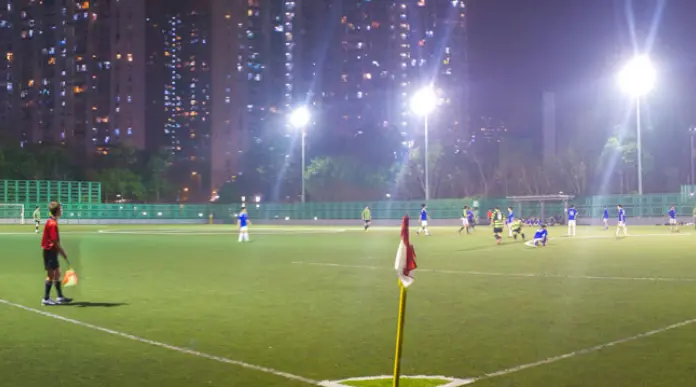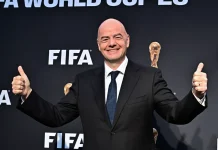For years, FIFA, the governing body of world football, projected an image of unity, global outreach, and sporting excellence. But beneath the surface, the organization was rotting from within. The 2015 corruption scandal shattered FIFA’s carefully curated reputation, revealing a network of greed, bribery, and abuse of power that extended across continents. From Sepp Blatter and Michel Platini to regional power brokers like Jack Warner and Jeffrey Webb, FIFA’s top officials were exposed for turning the world’s most beloved sport into a playground for personal profit. Bribes were exchanged for media rights, World Cup votes were bought and sold, and financial misconduct was rampant at the highest levels. What emerged was not just a series of isolated incidents, but a deeply entrenched system of corruption that operated with impunity for years under the FIFA banner.
Sepp Blatter
Sepp Blatter, FIFA President from 1998 to 2015, was the central figure in the corruption scandal that rocked world football. Although he was banned for eight years by FIFA’s Ethics Committee in 2015 for a controversial 2 million Swiss francs payment to Michel Platini, Swiss courts ultimately cleared him of corruption charges related to this payment after lengthy legal battles, accepting that it was a belated consultancy fee rather than a bribe. Despite his acquittal in Swiss courts, Blatter’s reputation remains deeply tarnished by the scandal, which forced his resignation and exposed widespread bribery and racketeering within FIFA’s leadership.
Michel Platini
Michel Platini, former UEFA President and one of European football’s most celebrated figures, was banned alongside Blatter for the same 2011 payment. Like Blatter, he was accused of fraud and mismanagement of FIFA funds. However, after years of legal proceedings, Swiss courts acquitted him, accepting the explanation that the payment was for consultancy work from 1998 to 2002 and was deferred due to FIFA’s financial constraints. The scandal destroyed Platini’s chances of succeeding Blatter as FIFA president and forced him to resign from UEFA.
Jérôme Valcke
Jérôme Valcke, FIFA’s Secretary General from 2007 to 2015, was banned for 12 years by FIFA’s Ethics Committee for financial misconduct, including the unauthorized sale of World Cup tickets at inflated prices. Valcke was implicated in multiple irregularities involving marketing and broadcasting rights and was a key figure in the corruption network exposed by the 2015 investigations. His ban reflected FIFA’s attempt to distance itself from the corrupt practices that flourished under his tenure.
Markus Kattner
Markus Kattner, FIFA’s Deputy Secretary General, was dismissed and banned for financial misconduct related to the misappropriation of funds. Kattner was accused of receiving excessive bonuses without proper authorization, contributing to the financial irregularities uncovered during the corruption probe. His case highlighted the systemic governance failures within FIFA’s executive management.
Chung Mong-Joon
Chung Mong-Joon, a former FIFA Vice President and South Korean businessman, was banned for six years for his involvement in bribery related to the 2018 and 2022 World Cup bidding processes. He was accused of offering bribes to secure votes for Russia and Qatar’s successful bids. Chung’s ban underscored the extent to which vote-buying influenced the selection of World Cup hosts, undermining the legitimacy of FIFA’s bidding procedures.
Jeffrey Webb
Jeffrey Webb, former CONCACAF President and FIFA Vice President, was arrested and pleaded guilty to charges including racketeering, wire fraud, and money laundering. Webb admitted to accepting millions in bribes in exchange for awarding marketing and broadcasting rights in the Americas. His cooperation with U.S. authorities was instrumental in exposing the broader corruption network within FIFA.
Alfredo Hawit
Alfredo Hawit, former FIFA Vice President and CONCACAF President, was arrested and banned for accepting bribes related to marketing rights and tournament hosting. Hawit’s involvement in the corruption scandal further revealed how FIFA officials exploited their positions for personal gain, often at the expense of the sport’s integrity and transparency.
Juan Angel Napout
Juan Angel Napout, former FIFA Vice President and CONMEBOL President, was arrested and charged with bribery and racketeering. He was implicated in schemes to rig marketing and media rights deals, receiving kickbacks in exchange for his influence. Napout’s case highlighted the corruption endemic in South American football governance under FIFA’s umbrella.
Eduardo Li
Eduardo Li, a member of FIFA’s Executive Committee from Costa Rica, was arrested and banned for his role in the corruption scandal. Li was accused of accepting bribes in exchange for awarding marketing rights for tournaments in the CONCACAF region. His involvement illustrated the wide geographic spread of corruption within FIFA’s leadership.
Eugenio Figueredo
Eugenio Figueredo, former FIFA Executive Committee member and CONMEBOL President, was arrested and charged with corruption offenses including bribery and money laundering. Figueredo was part of a network that manipulated marketing rights and tournament hosting in South America, enriching officials at the cost of fair governance.
Jack Warner
Jack Warner, former FIFA Vice President and CONCACAF President, was one of the most notorious figures in the scandal. Indicted on multiple counts of bribery, money laundering, and racketeering, Warner was accused of accepting millions in bribes related to World Cup hosting votes and marketing contracts. His case became emblematic of FIFA’s corruption crisis, showcasing how officials exploited their power for personal enrichment.
The FIFA corruption scandal exposed a deeply rooted system of bribery, fraud, and abuse of power that undermined the integrity of global football. Top officials exploited their positions for personal gain, turning the sport into a marketplace of backroom deals and bought influence. Despite promises of reform, FIFA’s credibility remains damaged, serving as a stark reminder of what happens when transparency is sacrificed for greed.













